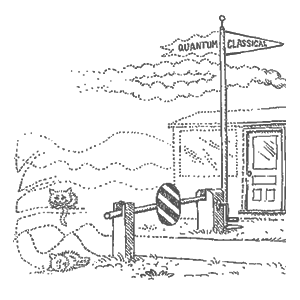
Quantum decoherence is the loss of quantum coherence.
Quantum
decoherence is the interaction of pure quantum states (like isolated
particles) with macroscopic objects.
In quantum mechanics, particles such as electrons are described by a wave function, a mathematical representation of the quantum state of a system; a probabilistic interpretation of the wave function is used to explain various quantum effects.
As long as there exists a definite phase relation between different states, the system is said to be coherent. A definite phase relationship is necessary to perform quantum computing on quantum information encoded in quantum states. Coherence is preserved under the laws of quantum physics.
If a quantum system were perfectly isolated, it would maintain coherence indefinitely, but it would be impossible to manipulate or investigate it. If it is not perfectly isolated, for example during a measurement, coherence is shared with the environment and appears to be lost with time; a process called quantum decoherence. As a result of this process, quantum behavior is apparently lost, just as energy appears to be lost by friction in classical mechanics.
No comments:
Post a Comment